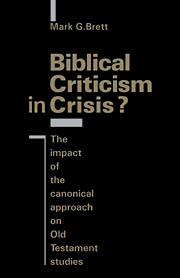Book contents
- Frontmatter
- Contents
- Acknowledgements
- List of abbreviations
- Introduction: Setting the scene
- 1 Distinguishing interpretative interests
- 2 The development of canonical exegesis
- 3 ‘Introduction’ and Old Testament theology
- 4 Has Childs fallen into Gabler's ditch?
- 5 Textual intentions and histories of reception
- 6 The future of the canonical approach
- Notes
- Bibliography
- Bibliographical key to the works of Brevard S. Childs
- Index of Old Testament references
- Index of subjects
- Index of authors
6 - The future of the canonical approach
Published online by Cambridge University Press: 10 October 2009
- Frontmatter
- Contents
- Acknowledgements
- List of abbreviations
- Introduction: Setting the scene
- 1 Distinguishing interpretative interests
- 2 The development of canonical exegesis
- 3 ‘Introduction’ and Old Testament theology
- 4 Has Childs fallen into Gabler's ditch?
- 5 Textual intentions and histories of reception
- 6 The future of the canonical approach
- Notes
- Bibliography
- Bibliographical key to the works of Brevard S. Childs
- Index of Old Testament references
- Index of subjects
- Index of authors
Summary
THE CRITIQUE OF IDEOLOGY
Having argued in the previous chapter that Gadamer's hermeneutics provides the most charitable way to understand the canonical approach, I want to stress that there are still some differences between Childs and Gadamer which prevent us from simply paraphrasing Childs's writing in Gadamerian terms. There are some residual problems which suggest that the canonical approach needs a more thorough reconstruction. Gadamer, for example, has consistently stressed that hermeneutics has a ‘productive’ aspect, that is, the interpreter needs to consider issues beyond the perspective of the author if the truth value of an author's text is to be taken seriously. Childs, on the other hand, wants both to emphasize the truth value of canonical Old Testament theology and at the same time to reject etic biblical studies which reformulate biblical theologies and reconstruct Israelite history using modern analytical concepts. But how can the biblical classic continue to demonstrate its truthfulness if the critical questions raised by later generations are excluded from the outset? How can the canonical approach avoid charges of fideism or dogmatic classicism? Childs's arguments so far provide no adequate way of responding to these charges. In the first part of this chapter I will argue that one possible way forward for the canonical approach would be to follow Gadamer's philosophical response to the critics of his classicism. In the second part of the chapter I will examine other alternatives.
Both Gadamer and Childs stress that a classic text can exercise considerable influence long after the time of its production.
- Type
- Chapter
- Information
- Biblical Criticism in Crisis?The Impact of the Canonical Approach on Old Testament Studies, pp. 149 - 167Publisher: Cambridge University PressPrint publication year: 1991



